- Home
- Richard F. Weyand
A Charter for the Commonwealth
A Charter for the Commonwealth Read online
A Charter
For The
Commonwealth
by
RICHARD F. WEYAND
Copyright 2018 by Richard F. Weyand
All Rights Reserved
ISBN 978-1-7321280-2-6
Printed in the United States of America
Cover Credits
Planet Image by: Nastco
Spaceship Room by: Natalia_80
Standing Woman by: miya227
Seated Man by: Romax Productions
Composition by: Romax Productions
Model: Nelson Shaffer
Back Cover Photo: Oleg Volk
Published by Weyand Associates, Inc.
Bloomington, Indiana, USA
June, 2018
CONTENTS
The Invitation
The Proposal
Now What?
The Admiral
Bones Of A Charter
High-Velocity Rocks
Location, Location, Location
A Dangerous Game
Warships
The Public Debate
Costing Them Money
Flying Nukes
Learning From The Past
Wolf In Sheep’s Clothing
The Big Question
In Transit
Earth
Doma
Distinguished Colleagues
Earth
The Census Debate
The Citizenship Debate
Halfway
The Video
The Charter Debate
The Council
First Blood
Letters
AARs
Reaction To The Charter
Jablonka
Countermoves
The Destruction of Doma
Reaction To Doma
The ESN Home Fleet
Regime Changes
The ESN Expeditionary Fleet
Celebrations
Planning The Future
The Relief of Doma
Another Regime Change
Yet Another Regime Change
Building the Future
A Request From Doma
The Yards
Fifteen Years On
Most of the names of the characters in this book are the names of Facebook friends who volunteered their names for that use. However, this book is a work of fiction. All of the characters, institutions, and activities described in this book are fictitious, and any resemblance to actual people, institutions, or activities are completely coincidental.
As just one example, Arlan Andrews, the major villain in the book, is also the name of a great guy and a really nice person.
Thank you to all those who volunteered their names.
R.F.W.
The Invitation
The Honorable James Allen Westlake VI looked south out of the picture window of the Planetary Governor’s office of the Earth colony on the planet Jablonka. His capital city of Jezgra spread out before him, both south and east. To the west was the great sea, the Voda Ocean.
The decision point had finally come, and he hesitated on the cusp.
His father, patriarch of one of the great families of Earth, had arranged this appointment for him ten years before. Then only twenty-eight years old, he was given administrative control of the entire planet, indeed the entire system. His charter was to maximize the profits Earth might make from the colony – from its asteroid mining operations, from its exports, and from tariffs on the imports the colony needed to expand, or even to survive.
He and his wife, Suzette Westlake nee Fournier, herself the progeny of another of the great families, had moved here with their two small children. And, over the years, a curious thing had happened. They had fallen in love.
With the planet. With its people. With their spirit.
They had come to believe the path they were on was not the best one, for Jablonka, for Earth’s other colonies, for humanity – even, long term, for Earth itself. Managing Earth’s colonies for the benefit of a hundred or so wealthy families on Earth, they knew, did not lead down the path to humanity’s best and brightest future.
Westlake had thought long and hard on it, but now his time was running out. There were ten years remaining on his charter as planetary governor, at which point he would be expected to return to Earth and assume control of his father’s holdings for the benefit of his children, siblings and cousins. He had set the ten-year anniversary of assuming the governorship as his decision point, and it was now here.
He went over to his desk and, on a piece of his engraved stationery, wrote a brief note. He sealed it in a matching envelope, wrote two names on the envelope, and rang for his driver.
Professor Gerald Ansen and his wife, Professor Mineko Kusunoki, were both at home today, it being between terms at the University of Jablonka. Ansen, at 68 years old, was retired from the university’s history department, while Kusunoki, age 39, was a professor of sociology.
Ansen had been one of the fledgling university’s first graduates almost fifty years before, and had moved back to Jablonka after receiving his doctorate on Earth, from Oxford University. Kusunoki was Earth born, and had accepted a position with the University of Jablonka after receiving her doctoral degree from the University of Tokyo. Their fields of study overlapped, and they had fallen in love despite the difference in their ages.
For all that, their marriage was a curious one. Ansen had tremendous appetites – for food, for drink, for tobacco, and for female companionship. He was a notorious roue, and had not slacked off once married. Kusunoki, by contrast, was a homebody, most comfortable curled up in the big armchair in her office, reading, writing, and studying. The part of their relationship most important to both of them was on the intellectual level, and their discussions of politics, history, and social organization would often run long into the night.
They were both at home when the large unmarked ground car pulled up in front of their home in Jezgra just after lunch.
“I’ll get it,” Ansen called to Kusunoki when the doorbell rang. He got up from his desk and walked out of his office, across the hall from hers, and down the hallway to the front door.
When he opened the door, he was a little nonplussed to see a man in a plain black uniform there, with the big black ground car at the curb behind him. He half expected to be arrested, on the grounds his writings were subversive or treasonous, but the uniformed man merely handed him a small envelope.
“I was instructed to wait for any response, sir.”
“Well, come in, come in,” Ansen said.
“I’ll wait here, sir. Take your time.”
“Very well.”
Ansen closed the door, leaving the uniformed man on the stoop, and looked at the envelope. Kusunoki had joined him in the entry to see who their visitor was.
“It’s addressed to both of us.”
Ansen pulled a small penknife from his pocket and slit the envelope open. He extracted a single-folded piece of stationery with the planetary governor’s seal. The note was personally written in a precise and decorative hand:
Profs. Ansen & Kusunoki,
I would appreciate the courtesy of a visit at your earliest opportunity.
James AllenWestlake
“I’ll be damned,” Ansen said, and handed the note to Kusunoki.
“That goes without saying,” she said as she accepted it.
Kusunoki read the note and handed it back.
“It’s not an arrest warrant, unless it’s a camouflaged one,” she said.
“I half expected one by this time. I have been pretty blunt in my writings the last ten years or so. ‘Life in prison’ just doesn’t have the sting it once did.”<
br />
Kusunoki chuckled. “So are we going to meet with him?”
“Oh, certainly. My curiosity is killing me. What would the scion of one of Earth’s most powerful autocratic families want with a classical liberal rabble-rouser like myself other than to see me hanged?”
“Convince you to see the error of your ways?”
“Unlikely. Well, I suppose there’s only one way to find out. Are you available right now if the driver says now’s a good time?”
“Sure. Just let me grab a wrap.”
Ansen opened the door. The driver was still waiting on the stoop.
“Would now be a good time to visit his Excellency?” Ansen asked.
“Yes, sir. I was told now would be a good time if you were free.”
Kusunoki came back with a shawl around her shoulders.
“All right, then,” Ansen said. “Let’s go see Mr. Westlake.”
The Proposal
“Ah, Professors. Come in, come in.”
The young, handsome, and impeccably dressed Westlake came around his desk to greet his professorially rumpled visitors, and shook their hands in turn, beginning with Kusunoki.
“Pleased to meet you, Professor Kusunoki. And you as well, Professor Ansen. Please, be seated.”
Westlake waved them to the side seating arrangement in his office, and Ansen and Kusunoki took seats on the large sofa. Westlake sat in a chair opposite.
“Can I offer you some refreshment? Tea, perhaps?” Westlake said to Kusunoki.
“Tea would be lovely. Thank you, Excellency.”
“And you, Professor Ansen? I have a very good bourbon you might enjoy.”
Ansen was surprised at Westlake’s due diligence, but replied evenly. “A large bourbon, with just a touch of ice, would be welcome, Excellency.”
“Excellent.” Westlake turned to the butler who had shown them in. “And a coffee for me, Henson.”
“Very good, sir.”
There was a finely crafted cigar humidor, with ashtray, cutter, and lighter, on the coffee table. Westlake turned the humidor toward Ansen and pushed it in his direction on the coffee table.
“Please, Professor Ansen, feel free.”
Ansen raised an eyebrow, and Westlake nodded. Ansen opened the humidor and selected a cigar, an Earth import, which made it deliriously expensive. He unwrapped it, cut the end off, and lighted it. Westlake was content to sit back and wait while he did so.
Only when Ansen was settled with his cigar, did Westlake begin.
“First, thank you for coming to see me.”
Ansen waved his cigar in a dismissive gesture, and Kusunoki nodded.
“I want to ask you some questions, which pertain directly to your academic specialties. I believe I already know the answers, but I want to confirm them with you. Then I might have a small proposal to make to you.
“First, are the Earth’s current political and economic arrangements with the colony planets sustainable, oh, say, on the medium term?”
Ansen and Kusunoki looked at each other and back to Westlake.
“This is not some sort of trap,” Westlake said. “First, for my own safety, this conversation is not being recorded. Second, as I said, I believe I already know the answers to these questions, so I will just tell you I do not believe they are sustainable on the medium term. Am I right in that?”
“Yes, that’s right,” Ansen answered, and Kusunoki nodded.
There was an interruption as the butler returned with a tray, which he set on a side table. He had a small pot of tea for Kusunoki, a small pot of coffee for Westlake, and a small tray with cream, sugar, and lemon wedges, which he set between them. Cups, saucers, and spoons followed. He then put a large rocks glass of bourbon with a single ice cube in front of Ansen. He also set the bourbon decanter and a small bowl of ice cubes, with tongs, on the coffee table and followed them with a small plate of cookies in the center of the table.
“Thank you, Henson,” Westlake said.
“Certainly, sir.”
After the butler had left and closed the door behind him, Westlake resumed his questioning.
“When the current situation changes, how does it change? What is the most likely scenario?”
“The pressure continues to build,” Kusunoki said, “until the colonies rebel against Earth’s rule and seek, and ultimately win, their independence.”
“This is because the distances are so great. Is that right, Professor Kusunoki?”
“That’s correct, Excellency. The physical division, combined with the unequal relationship, results in growing pressure until the political division occurs.”
Westlake nodded. “And when the colonies split off, do they do so one at a time, or in groups?”
“If the split is earlier, it has to be in groups. Strength in numbers. The longer it is until the split happens, the more the pressure builds and the more likely it is the split is piecemeal.”
“And how violent is the split?”
“The violence will be proportional to the force disparity between Earth and the splitting colony or colonies.”
“So the stronger the splitting group is, the less violence there will be?”
“That’s right. It’s counterintuitive, but small rebellions get put down much more viciously than large ones. There is less possibility of reprisal against the parent country, so there is less restraint in the response.”
“And what sort of government do the splitting colonies end up with?”
Until this point, Ansen had been content to sip his bourbon and smoke his cigar, but at this question he stirred and took the floor.
“Historically, it could be just about anything, Excellency. Representative republic, loose commonwealth, strongman autarchy, plutocracy, fascism, communism, it runs the gamut. It depends.”
“On what does it most depend, Professor Ansen?”
“On the structures already in place.”
“So whatever is in place at the time of the split, remains in place?”
“Usually. By the time the split is fait accompli, everyone is tired of the destruction and disruption, and they work with the existing structure. The alternative is to go through another period of disruption to change it, and people are weary of the whole process by that point. Change won’t come for at least another generation, usually two.”
“All right. Good,” Westlake said. “I appreciate your honest answers. I had gotten this far on my own, and I’m glad I was right.
“So let’s review. The current situation is not sustainable on the medium term. The colonies will split off from Earth and pursue their own goals as one or more independent nations. The amount of violence associated with that will be held to a minimum if the colonies stick together. And the ultimate structure of the resulting colony government will be a reflection of the structure under which the split occurs.”
Kusunoki and Ansen both nodded.
“That’s a good summary of the most likely outcomes, yes,” Ansen said.
“And, if the colony government that results is, for example, a representative government, with broad individual freedoms along classical liberal lines, what happens next?”
Ansen raised an eyebrow, and Westlake chuckled.
“Over the last five years, I have read everything you have ever written on the subject, Professor Ansen. I know your politics like the back of my hand. Let’s say your dream government emerges from the split. What happens next?”
“Historically speaking, Earth and the colonies fight another war, at Earth’s instigation, to finally settle the issue.”
“And?”
“Earth loses. The current structure can’t compete with an open society.”
“And?”
“The Earth government falls.”
“And is replaced by what?”
“Sooner or later, an open society. It has to be, to compete. Either that or it falls into backwardness and, ultimately, irrelevance.”
“And what would the relationship between the
colonies and the Earth government be then, Professor Ansen?”
“Friends, Excellency. Plenty of historical precedent there. Britain and India. Britain and the United States of America. France and Vietnam. France and Algeria.”
“Yes, that’s right,” Kusunoki said. “With the political pressures resolved, the cultural ties draw the colonies back into a relationship with the colonial power, but now in a friendship of equals.”
Westlake nodded, and sat back in his chair smiling.
“You see,” Westlake said, “you two are professionals, students of this area with decades of experience. You have thought through all these issues, studied them, written about them. How things have unfolded in the past –” with a nod to Ansen “– and why they unfold that way –” with a nod to Kusunoki. “I have had to work my way through your writings, and give quite a bit of thought to it, to replicate that understanding. But, now that we are all agreed on the situation and its likely prospects, the question is, What do we do about it?”
Westlake leaned forward, elbows on knees, hands clasped.
“And so I would make you a little proposal. I would like the two of you to design a government for the colonies. A classical liberal, open society type of government. When the split happens, that is the structure that must be in place. Let it be seared in place by the flames of war, so it prevails when the smoke clears. Make it the very best government you can, using all your combined knowledge of history and sociology. Design the future, and make it the best future you can.”
Ansen and Kusunoki just stared at Westlake. Was the scion of one of Earth’s most powerful families, and likely the richest individual off Earth itself, authorizing them to foment revolution against himself?
“Excellency, I – I don’t understand,” Kusunoki said.
“We are all agreed, correct, Professor? Over the medium term, the colonies split away. The best possible outcome is for the colonies at that point to adopt – or, rather, to have already adopted, and retain – a classical liberal government. An open society. And ultimately, if we are lucky and we’ve done our homework, that classical liberal government will prevail against Earth, and Earth itself will ultimately become a classical liberal government, an open society, and be on friendly terms with the colonies.

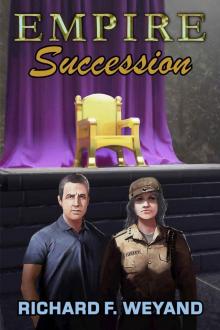 EMPIRE: Succession
EMPIRE: Succession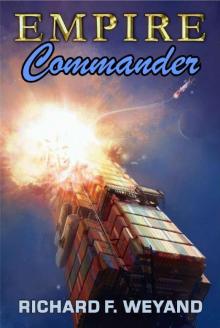 Commander
Commander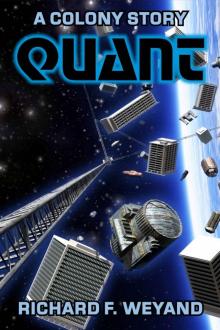 QUANT (COLONY Book 1)
QUANT (COLONY Book 1)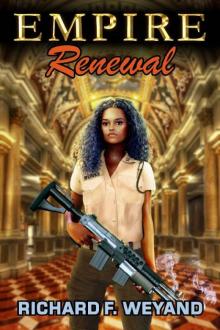 EMPIRE: Renewal
EMPIRE: Renewal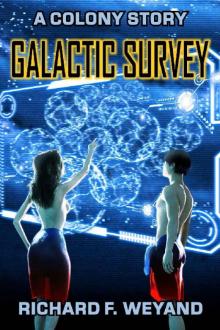 GALACTIC SURVEY (COLONY Book 3)
GALACTIC SURVEY (COLONY Book 3)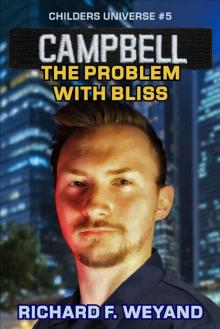 Campbell- The Problem With Bliss
Campbell- The Problem With Bliss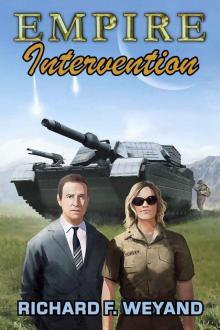 EMPIRE: Intervention (EMPIRE SERIES Book 13)
EMPIRE: Intervention (EMPIRE SERIES Book 13)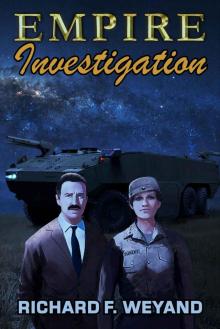 EMPIRE: Investigation
EMPIRE: Investigation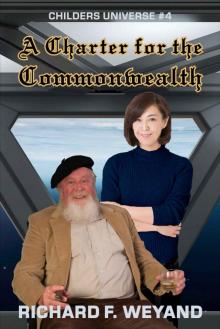 A Charter for the Commonwealth
A Charter for the Commonwealth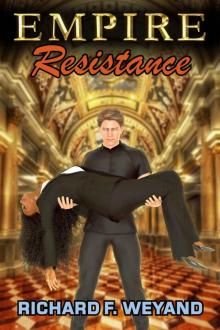 EMPIRE: Resistance
EMPIRE: Resistance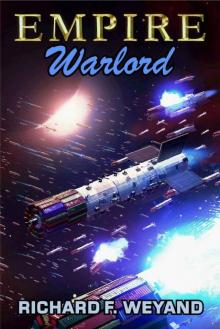 EMPIRE: Warlord (EMPIRE SERIES Book 5)
EMPIRE: Warlord (EMPIRE SERIES Book 5)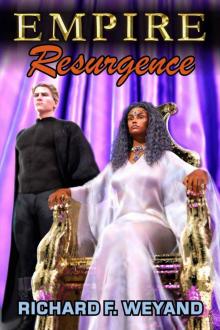 EMPIRE: Resurgence
EMPIRE: Resurgence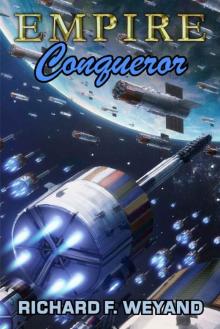 EMPIRE: Conqueror (EMPIRE SERIES Book 6)
EMPIRE: Conqueror (EMPIRE SERIES Book 6)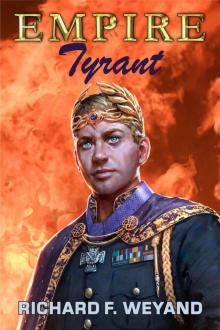 Tyrant
Tyrant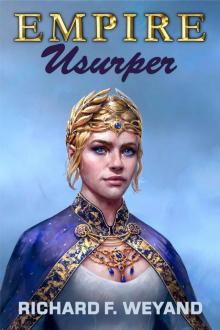 Usurper
Usurper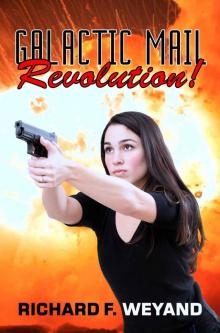 Galactic Mail: Revolution! (Childers Universe Book 3)
Galactic Mail: Revolution! (Childers Universe Book 3)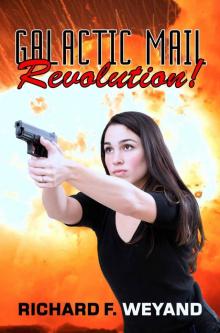 Galactic Mail_Revolution!
Galactic Mail_Revolution!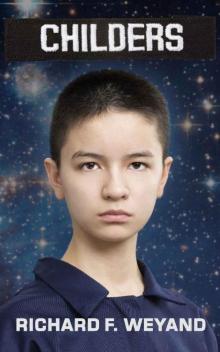 Childers
Childers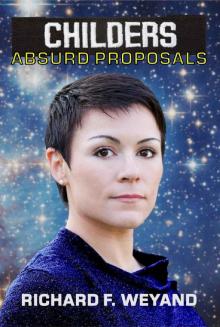 CHILDERS_Absurd Proposals
CHILDERS_Absurd Proposals